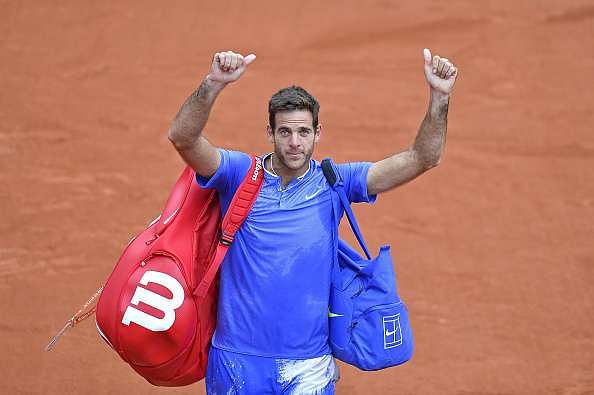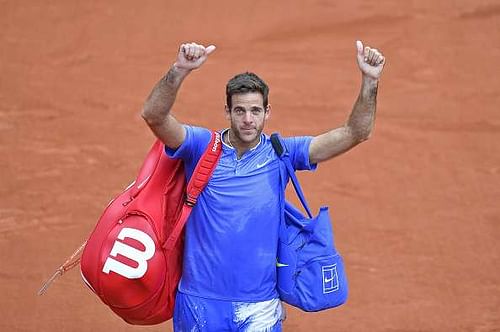
Roland Garros 2017 diary: Juan Martin del Potro and the art of non-choking

Juan Martin del Potro
What is it about fickle weather and cities that host Grand Slams? At every Major that I've attended so far, the weather has been as unpredictable as a Nick Kyrgios groundstroke. In Melbourne it rained whenever the clouds were in the mood for it, while in New York the weather oscillated between unbearably humid and violently stormy.
In Paris, it was bright and sunny the first couple of days I visited the arena, but since yesterday it's been overcast and chilly, constantly threatening to throw the schedule into disarray. Today the rain held off until Andy Murray and Juan Martin del Potro could finish their much-anticipated third round clash, but Kei Nishikori and Hyeon Chung weren't so lucky; their match was interrupted just when things had started looking interesting.
The upside of rain delays is that you get time to attend the press conferences, and also get a bit of writing done. And a lot can be written about the Del Potro vs Murray match.
There’s a theory that the further removed you are from a phenomenon – by distance or any other measure – the easier it is to dismiss the phenomenon as something that can be easily controlled. And while I’m no expert at confirming theories, my experience of watching tennis from the stands has made me a believer in this one.
If you followed today’s marquee match, especially the first set, you’d be inclined to scoff at the way the Argentine ‘choked’. He held four set points in that first set, and squandered them all – with the most painful of them being a double fault in the tiebreaker.
But as the spectators on Philippe Chatrier saw the two men trading fierce groundstrokes, they felt sympathy, rather than contempy, for Del Potro and his plight.
The margins in tennis, as in any sport, are slim. One moment you are hitting a brilliant second serve that catches the line and elicits a return error, the next moment you miss the line by an inch and cough up a double fault. That applies to ground strokes too; while the Del Potro forehand is considered so great because it is powerful AND safe, it doesn’t take a lot for it to overshoot the line or hit the top of the tape.
Yes, the great players tend to make the margins work for them, ‘creating their own luck’ as the adage goes. But the ones that fall prey to the laws of probability aren’t doing so because they are mental midgets; they are simply not as inhumanly clutch as the great ones.
Del Potro knew he had his chances, even when he unloaded that final forehand of the set that sailed wide by a whisker. He asked the chair umpire to check the mark, but got no joy. It has to be said, however, that he didn’t miss by much – just like he didn’t miss the second serve on set point by much. If he had made both or either of those shots, would we have been hailing his big-point courage instead? The line is almost too fine.
But then, something happened that made us forget all about the dreaded c-word. With Murray fist-pumping and settling into his chair, Del Potro remained at the net, head bowed and shoulders hunched, seemingly lost in thought.
This went on for a good two minutes, and the spectators in the stands started murmuring awkwardly about the Argentine’s mental well-being. Was he unconvinced that his forehand had landed out, or was he just crushingly disappointed that he had let the set slip through his grasp despite having so many opportunities?
It was hard to tell at that time. But later, the Argentine clarified that it was indeed disappointment. “Too much frustration,” he said in his post-match press conference. “I couldn’t believe that I lost that set, because I had many opportunities to win.”
Del Potro eventually regained his composure, and did well to break Murray while the latter was serving for the second set at 5-4, but everyone in the arena knew that his moment had passed. Whatever he was doing seemed like a spirited but last-gasp attempt to prolong the match. With all the injury troubles he’d had of late, there was no way he was going to outlast Murray in four or five sets.
Del Potro should have won that first set, and maybe if he had he would have won the match too. But it would be selling him short to dismiss his loss as a ‘choke’; he just went for a little too much on the crucial points of the match, and unluckily missed the mark just when it mattered most.
The crowd, at any rate, was willing to forgive him all his imagined or real transgressions from the first set. About mid-way through the second, chants of “DEL-PO!” *clap clap clap* “DEL-PO!” *clap clap clap* started reverberating around the arena every time he seemed in need of inspiration. And when he broke Murray to even the second set at 5-5, the whole place seemed to come alive.
Del Potro’s resurgence didn’t last long, but the crowd support did. They shouted raucously at every forehand winner that he hit, even in the dying stages of the match. And as he walked off the court, he was given the loudest cheer of the day, with more chants of “DEL-PO! DEL-PO! DEL-PO!”.
Maybe it’s okay to say that Del Potro choked. At least he knows he will always have something to lessen the pain – the love of the crowd, in its most empowering and exhilarating form.